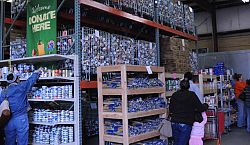Needs are great for CCS Northern Utah
(Editor’s note: This is one in a series of articles about Catholic Community Services in Utah. The Diocese of Salt Lake City has designated Catholic Community Services as the local charity of choice for the Year of Faith. Each month, CCS is collecting specific items for one of its 10 programs. For December, CCS is collecting holiday food items for its food pantries.) OGDEN — Tuna fish, diapers, toothbrushes and more subsidized housing top the holiday wish list for Marcie Valdez, director of Catholic Community Services Northern Utah, whose office distributes about 200,000 pounds of food every month through its food pantry and helps about 30 clients with housing. "We’re currently serving 2,300 households every month through the food pantry, and that is nearly double what we were serving two years ago," Valdez said. "The food pantry used to be an emergency food source for families; they would come in for a few months, their situation would stabilize, and they would move on. But now what we’re seeing is the food pantry is becoming a long-term solution to their monthly food shortage. People are not moving on. They’re needing to come in each and every month.... Many people just are not making enough money every month to live." The food pantry is open four days a week. "On a busy day we’ll have 200 families; on an average day it’s about 100 to 130. Every day," Valdez said; clients often must wait more than an hour to get their food because of the crowd. Community support, from food drives to volunteers helping in the warehouse, is essential, Valdez said. "I’m grateful that the community donations have increased with the need. Every time I see a basket of food go out that door I think about how many people made that possible." Forty percent of the food comes from community food drives, 30 percent from the Utah Food Bank, and 30 percent from local grocery stores that donate food nearing its expiration date. Pasta, peanut butter and canned tuna are always in demand, said Rose Martinez, CCS warehouse manager. "One thing that folks always want a lot of is our tuna. I always feel bad because I have such a limited amount, so I only allow folks to get one or two cans, and it’s heartbreaking for me when the folks say, ‘I have so many in my family, what am I going to do with one or two cans?’" Hygiene items such as toothbrushes and shampoo, which can’t be purchased with food stamps, also fly off the shelves, Valdez said, as do diapers sizes 3, 4 and 5. "Oftentimes you see parents making difficult choices – leaving a diaper on a child a little longer to make them last longer because they don’t have money to go buy new ones," she said. CCS serves a wide range of clients: about 15 percent are disabled individuals, 15 percent are seniors, and about 60 percent families; overall, about 40 percent are Hispanic, Valdez said. About 100 new families each month fill out food applications; to qualify, they must be at 150 percent of the poverty level. For CCS Northern Utah’s housing program, more than 75 percent of clients are single mothers. "A lot of the folks are coming out of the shelter, or have been living with somebody for a long period of time and have eventually lost all of their belongings," said Deborah Nielson, the housing case manager, adding that CCS tries to provide these individuals with kitchen items and bedding when they move in. Housing for seniors on Social Security and disabled individuals is particularly hard to find, Valdez said. "They really can’t be self-sufficient unless we can find them subsidized housing, and there isn’t enough subsidized housing for elderly and disabled. I think that’s the one that breaks my heart the most, our seniors and disabled people on Social Security, because there’s not a way for them to really improve their situation, so it’s hard to see them struggle." Donations may be made at any CCS location.
© Copyright 2025 The Diocese of Salt Lake City. All rights reserved.


Stay Connected With Us